
Myrmecological News
Scope & Guideline
Unveiling the Secrets of Ant Behavior and Ecology
Introduction
Aims and Scopes
- Ecological roles of ants:
Research articles often explore the function of ants as ecosystem engineers, their contributions to nutrient cycling, and their interactions within various ecosystems, emphasizing how they shape their environments. - Ant physiology and behavior:
The journal provides insights into the physiological mechanisms and behavioral adaptations of ants, including foraging strategies, communication, and social structures within colonies. - Taxonomy and biodiversity of ants:
Myrmecological News publishes taxonomic revisions, descriptions of new species, and analyses of ant diversity, contributing to the understanding of ant phylogeny and classification. - Microbial interactions and symbiosis:
Articles frequently investigate the relationships between ants and their microbiomes, including the role of symbiotic bacteria and other microorganisms in ant health and behavior. - Impact of environmental changes:
The journal addresses how factors such as urbanization, climate change, and habitat modification influence ant populations and community dynamics.
Trending and Emerging
- Ecosystem services provided by ants:
There is an increasing emphasis on understanding how ants function as ecosystem engineers and their role in providing services such as soil aeration and pest control, highlighting their importance in ecosystem management. - Microbial ecology associated with ants:
Recent studies have shown a rising interest in the gut microbiomes of ants and their interactions with various microbial communities, emphasizing the significance of these relationships in ant health and behavior. - Behavioral ecology and cognition:
Research into the cognitive abilities and behavioral strategies of ants is gaining traction, with a focus on their decision-making processes and social behaviors, reflecting a broader trend towards understanding the complexities of insect intelligence. - Urban ecology of ants:
As urbanization continues to expand, there is a notable trend in investigating how urban environments affect ant communities, their behaviors, and their ecological roles, which is critical for urban planning and biodiversity conservation.
Declining or Waning
- Historical and fossil studies:
Research on fossil ants and historical ecology appears to be less frequent, possibly due to a growing emphasis on contemporary ecological and behavioral studies over paleontological insights. - Ant-plant interactions:
While this topic was once a significant focus, recent publications indicate a waning interest in the nuances of ant-plant mutualisms, possibly overshadowed by broader ecosystem interactions. - Ants in agricultural contexts:
The exploration of ants as pest controllers or their roles in agricultural systems has decreased, suggesting a shift towards more fundamental ecological research rather than applied studies.
Similar Journals
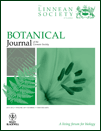
BOTANICAL JOURNAL OF THE LINNEAN SOCIETY
Exploring the Frontiers of Plant Science and EcologyThe Botanical Journal of the Linnean Society, published by Oxford University Press, stands as a premier platform for interdisciplinary research within the realms of Ecology, Evolution, Behavior, and Plant Science. With a notable impact factor reflective of its esteemed reputation, this journal is classified in the Q1 quartile for both Ecology and Plant Science, placing it among the most influential publications in these fields. Since its inception in 1969, and with an anticipated convergence of research extending to 2024, it has become essential for scholars and professionals seeking to engage with cutting-edge studies, theoretical frameworks, and practical applications that drive our understanding of plant biology and ecological systems. The journal’s commitment to excellence is underscored by its robust Scopus rankings—achieving an impressive 83rd percentile in Ecology and a 82nd percentile in Plant Science. This makes the Botanical Journal of the Linnean Society a crucial resource for researchers, educators, and students alike, eager to advance their knowledge and contribute to the evolving discourse in botany and environmental studies.
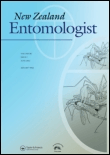
NEW ZEALAND ENTOMOLOGIST
Unveiling the Secrets of Insect Biology and EcologyNEW ZEALAND ENTOMOLOGIST, published by Taylor & Francis Ltd, is a distinguished journal in the field of Insect Science, featuring a rich history dating back to its initial publication in 1952. As a platform for sharing innovative research and critical insights, this journal serves as a vital resource for entomologists and scientists interested in the diverse aspects of insect biology, ecology, and behavior. Although it currently holds a Q4 category in its discipline with Scopus ranking it at the 163rd out of 181 journals, the NEW ZEALAND ENTOMOLOGIST continues to uphold high-quality standards of peer-reviewed articles that contribute significantly to the understanding of insects, particularly within the unique ecosystems of New Zealand. Researchers and professionals are encouraged to submit their findings to enhance the journal's growing repository of knowledge, while students will find a wealth of information to aid their studies and foster their interest in entomological research.

Insects is a prominent open-access journal published by MDPI, dedicated to advancing research in the vibrant field of insect science. Since its inception in 2011, this journal has become a vital resource for academics and professionals alike, also ranked in the prestigious Q1 category within the Insect Science field by Scopus, achieving a remarkable rank of 26 out of 181 journals. With an ongoing convergence period from 2010 to 2024, Insects provides comprehensive coverage of various aspects of entomology, including but not limited to ecology, behavior, physiology, and applied entomology. Based in Switzerland, the journal promotes an open-access model, ensuring that vital research is readily available to researchers, practitioners, and students globally. This journal not only facilitates the dissemination of groundbreaking entomological research but also fosters collaboration and interdisciplinary dialogue in the field.
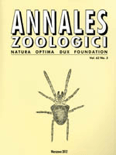
ANNALES ZOOLOGICI
Fostering Insights into Animal Behavior and SystematicsANNALES ZOOLOGICI is a distinguished academic journal published by the Museum & Institute of Zoology, Polish Academy of Sciences, based in Warsaw, Poland. With a long-standing tradition in zoological research, this journal has evolved to encompass a diverse range of studies in ecology, evolution, behavior, and systematics, aiming to foster a deeper understanding of animal biology and conservation. It holds a commendable Q2 classification in the 2023 Ecology, Evolution, Behavior and Systematics category, indicating its significant contribution to the field. Although ANNALES ZOOLOGICI is not an open-access publication, it remains accessible to a global audience of researchers, professionals, and students aiming to advance their knowledge and engage with cutting-edge zoological findings. As of 2024, this journal continues to be a vital resource for those eager to explore the complexities of animal life and contribute to ongoing discussions within this essential scientific discipline.
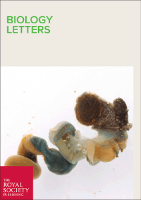
Biology Letters
Fostering impactful research for the future of biology.Biology Letters, published by the esteemed Royal Society, stands at the forefront of research in the field of biological sciences, with a strong emphasis on innovative studies that bridge gaps across disciplines. Since its inception in 2005, the journal has garnered significant recognition, achieving a remarkable Q1 ranking in Agricultural and Biological Sciences (miscellaneous) and a percentile of 88th in the same category, according to Scopus rankings. Released in the United Kingdom, the journal offers a platform for authors to share concise research findings and theoretical perspectives that contribute meaningfully to the advancement of biological inquiry. Although not open access, the journal remains highly regarded in the academic community for its rigorous peer-review process and impactful content, making it an invaluable resource for researchers, professionals, and students dedicated to exploring the complexities of biology. With an ongoing commitment to excellence, Biology Letters continues to shape the future of biological sciences.

JOURNAL OF INSECT BEHAVIOR
Fostering Collaboration in Insect Science ResearchJOURNAL OF INSECT BEHAVIOR, published by SPRINGER/PLENUM PUBLISHERS, stands as a pivotal platform for disseminating cutting-edge research in the fields of insect science and behavioral ecology. Since its inception in 1988, the journal has continuously contributed to our understanding of insect behavior and its ecological implications, boasting an impressive range of studies that address both evolutionary and systemic perspectives. With its current rankings placing it in the Q3 quartile for both Ecology, Evolution, Behavior and Systematics and Insect Science categories, the journal is positioned within the competitive landscape of agricultural and biological sciences, offering insightful contributions to practitioners and academics alike. Although currently not an open-access journal, it ensures wide accessibility through numerous academic institutions and libraries, thereby fostering global collaboration. Researchers, professionals, and students are encouraged to engage with the rich array of articles that not only advance theoretical knowledge but also inform practical applications in managing insect populations and preserving biodiversity.
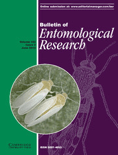
BULLETIN OF ENTOMOLOGICAL RESEARCH
Pioneering Research at the Nexus of Entomology and HealthBULLETIN OF ENTOMOLOGICAL RESEARCH, published by Cambridge University Press, is a prestigious journal that has been at the forefront of entomological research since its inception in 1910. With an impressive track record extending through to 2024, this journal serves as a vital platform for advancing knowledge in various related fields, notably Agronomy and Crop Science and Insect Science, where it ranks in the top quartile (Q2) and maintains a commendable position within the Scopus rankings in its categories. Notably, its contributions also intersect with Medicine in a broader scope, fostering interdisciplinary insights. While access to the journal content is not classified as 'Open Access,' its rigorous peer-reviewed articles are crucial for researchers, professionals, and students seeking to enhance their understanding of entomology and its applications in agronomy and beyond. The journal's impact is reflected in its notable percentile rankings, emphasizing its relevance and influence in the academic community. Located at the heart of the UK, the BULLETIN OF ENTOMOLOGICAL RESEARCH continues to be an essential resource for those dedicated to the study and understanding of insects and their impacts on agriculture and health.

ACTA ENTOMOLOGICA MUSEI NATIONALIS PRAGAE
Bridging Research and Discovery in EntomologyACTA ENTOMOLOGICA MUSEI NATIONALIS PRAGAE, published by the esteemed NARODNI MUZEUM - PRIRODOVECKE MUZEUM in the Czech Republic, is an influential journal in the fields of Ecology, Evolution, Behavior and Systematics, as well as Insect Science. With an ISSN of 0374-1036 and an E-ISSN of 1804-6487, this journal has established itself as a vital resource for researchers, professionals, and students interested in the intricate world of entomology. Spanning publications from 2005 to 2024, it is recognized for its contributions to the understanding of insect biology, offering insights on ecological interactions and evolutionary relationships. Although it operates as a subscription-based platform, the journal maintains a respectable presence in scholarly circles, positioned in the Q2 quartile for both relevant categories in 2023. ACTA ENTOMOLOGICA serves not only as a repository of significant empirical findings but also as a discourse platform for emerging entomological concepts, making it an essential read for those involved in the biological sciences.
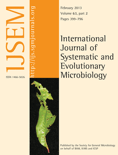
INTERNATIONAL JOURNAL OF SYSTEMATIC AND EVOLUTIONARY MICROBIOLOGY
Exploring the Depths of Microbial DiversityInternational Journal of Systematic and Evolutionary Microbiology, published by the Microbiology Society, stands at the forefront of microbiological research, focusing on the systematic and evolutionary aspects of microorganisms. With its ISSN 1466-5026 and e-ISSN 1466-5034, this prestigious journal not only boasts an impressive impact within its fields—ranked Q1 in both Ecology, Evolution, Behavior and Systematics and Medicine (Miscellaneous), and Q2 in Microbiology for 2023—but also consistently provides an open access platform for researchers to disseminate their findings. Established in 2000, the journal has established itself as an essential resource for professionals and students alike, offering insights into microbial diversity, systematics, and evolutionary pathways. By providing a rich repository of knowledge with a global reach from its UK base, IJSEM continues to enhance our understanding of the microbial world, fostering collaboration and innovation in microbiological science.

Journal of Insect Biodiversity
Illuminating the Path of Insect Biodiversity ResearchJournal of Insect Biodiversity, published by MAGNOLIA PRESS in New Zealand, offers a vital platform for researchers and professionals interested in the intricate world of insect science. Established in 2019, this journal covers a wide array of topics within its field, focusing on the ecological, evolutionary, and behavioral aspects of insects, while also engaging with paleontological perspectives. With an impressive Q2 and Q3 categorization in multiple ecological disciplines and a growing influence in the Scopus rankings, it serves as an essential resource for scholars aiming to deepen their understanding of insect diversity and its implications for ecosystems. The journal is committed to open access, promoting the dissemination of knowledge without barriers. Researchers, students, and professionals alike will benefit from the timely contributions this journal offers as it continues to reflect the dynamic and evolving nature of insect research up to the year 2024.